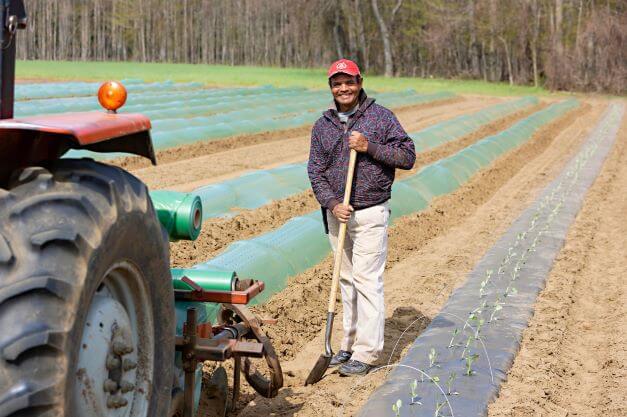:format(webp)/https://www.thestar.com/content/dam/thestar/uploads/2022/10/17/luiz-rodrigues-0.jpg)
Family, friendship, and farms define life for Ontario’s migrant farm workers
Fall harvest season is in full swing on many of Ontario’s fruit and vegetable farms. For migrant farm workers who come to Canada every year as part of the Seasonal Agricultural Worker Program (SAWP), this means it’s almost time to go home and rejoin their families.
It’s a highly anticipated time of year for workers who, while welcoming the opportunities that farm jobs in Canada offer, deal with the challenges of being away from home for months at a time.
“My first reason to come to Canada is to give my family – my wife and children – a better life,” says Mexican Luis Rodrigues who works at a market garden farm near Port Elgin. “The sacrifices that each of us have had to make are difficult. Just imagine six to seven months away from them. It’s hard.”
It’s worth it, though, he says, proudly noting that his oldest daughter is now studying child psychology at university while his other daughter is finishing high school.
Rodrigues is one of over 17,000 workers from Mexico, Jamaica, Trinidad & Tobago, Barbados, and the Eastern Caribbean Islands who are part of this program, which started in 1966 to provide employment opportunities for workers in the region and help Ontario farmers grow and harvest produce.
Farm workers can also come to Canada under the agricultural stream of the federal Temporary Foreign Worker (TFW) program. One of the big differences is that the work is typically year-round, and the program is open to more countries. The motivation to come to Canada is the same, however – securing a better life for themselves and their families.
Bunjong Jitthai has worked at a tomato greenhouse in Chatham for two and a half years, but his long-term plans are focused on building a future back home in Thailand.
“Working in Canada is a good opportunity for me to make money to support my family back home,” he says. “My plan is to buy land in Thailand, build a house and a cattle farm, and support my family.”
Regardless of which government-approved program brings them to Canada however, once they’re here, workers have the same rights and privileges as Canadian workers doing the same work. Their employers also have the same obligations towards them as they do for their local employees.
That includes minimum wage, workplace safety protections and other employment standards, as well as access to health care, workplace insurance coverage and Employment Insurance. Worker housing is inspected by local public health units to make sure regulations are met and can be visited throughout the season by support staff – called liaison officers – from the worker’s home country, called liaison officers.
It’s part of what has made SAWP an attractive option for workers, many of whom are part of the program for years, often at the same farm. Rodrigues, for example, has been coming to Canada for 22 years, with the last 14 spent at the same farm.
Neil Philip from Trinidad & Tobago first learned about SAWP jobs in Canada from his uncle, who came to Ontario to work every year for more than 30 years. It’s now been more than 10 years since Philip himself started a seasonal job at a strawberry greenhouse in Norfolk County, and he spends the off-season at home working as a roofing sub-contractor.
“Ever since high school, I’ve always liked farming. Before I came to Canada, I worked as a security officer at the University of the West Indies and at Piarco International Airport,” he says. “I’ve learned so much since coming here. The farmers are always so willing to show us everything they know, and they’ve really helped to build my confidence in doing the work that I do here.”
Rodrigues also values the friendships he’s built in Canada and the welcoming nature of his local Ontario community to migrant workers, who’ve become part of the local soccer league and joined church groups. In fact, several years ago, a cultural centre in nearby Southampton developed and hosted an exhibit focused on the lives of migrant workers in the community to showcase their experiences.
“The years I have been coming to Canada I have built great friendships. Canadians are very friendly no matter who you are or your status. Often happens that we cannot speak English, but they try to communicate, they open themselves to spend time with us,” he says. “I would like to thank Canada for letting me come and find what I have been looking for. Especially good friends from both, Mexico and Canada.”
To read more Ontario migrant farm worker stories in their own words, visit www.morethanamigrantworker.ca.


:format(webp)/https://www.thestar.com/content/dam/thestar/uploads/2022/10/17/bunjong-jitthai-photo-0.jpg)
:format(webp)/https://www.thestar.com/content/dam/thestar/uploads/2022/10/17/neil-one-0.jpg)